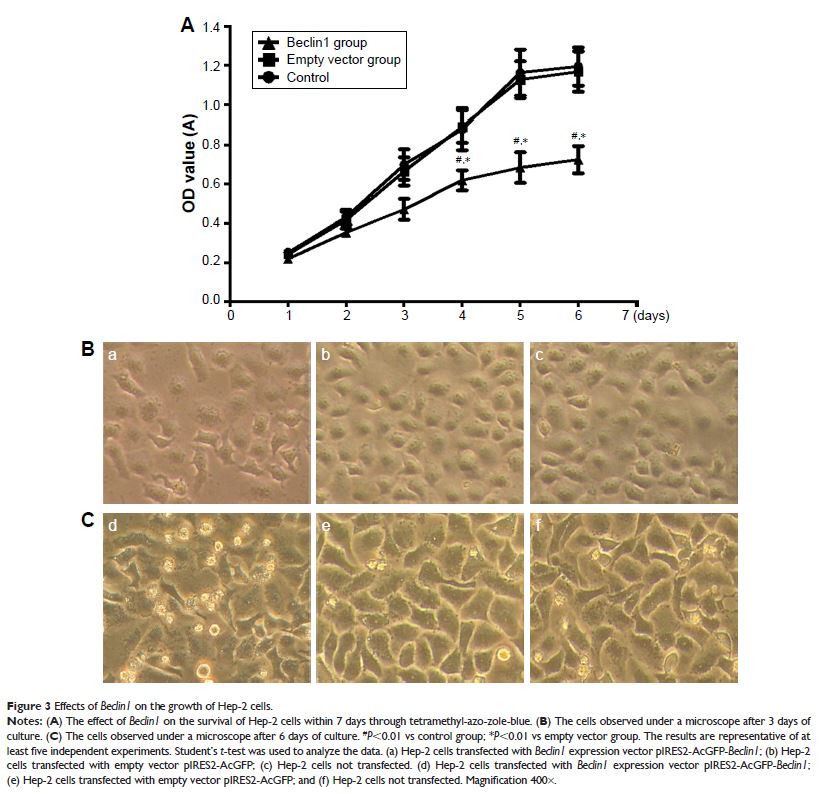9 0 5 7 8
论文已发表
注册即可获取德孚的最新动态
IF 收录期刊
- 2.6 Breast Cancer (Dove Med Press)
- 3.9 Clin Epidemiol
- 3.3 Cancer Manag Res
- 3.9 Infect Drug Resist
- 3.6 Clin Interv Aging
- 4.8 Drug Des Dev Ther
- 2.8 Int J Chronic Obstr
- 8.0 Int J Nanomed
- 2.3 Int J Women's Health
- 3.2 Neuropsych Dis Treat
- 4.0 OncoTargets Ther
- 2.2 Patient Prefer Adher
- 2.8 Ther Clin Risk Manag
- 2.7 J Pain Res
- 3.3 Diabet Metab Synd Ob
- 4.3 Psychol Res Behav Ma
- 3.4 Nat Sci Sleep
- 1.9 Pharmgenomics Pers Med
- 3.5 Risk Manag Healthc Policy
- 4.5 J Inflamm Res
- 2.3 Int J Gen Med
- 4.1 J Hepatocell Carcinoma
- 3.2 J Asthma Allergy
- 2.3 Clin Cosmet Investig Dermatol
- 3.3 J Multidiscip Healthc

Beclin1 过表达可抑制人喉癌细胞 Hep-2 的增殖并促进细胞凋亡
Authors Wan B, Zang Y, Wang L
Received 11 August 2017
Accepted for publication 28 January 2018
Published 4 July 2018 Volume 2018:11 Pages 3827—3833
DOI https://doi.org/10.2147/OTT.S148869
Checked for plagiarism Yes
Review by Single-blind
Peer reviewers approved by Dr Lucy Goodman
Peer reviewer comments 4
Editor who approved publication: Dr Jianmin Xu
Objective: Beclin1 was previously found
to be downregulated in human laryngeal cancer (LC) tissues, and it results in
poor prognosis. This study aimed to further confirm the antitumor effects
of Beclin1 in LC cell line
Hep-2.
Materials and
methods: Beclin 1 was overexpressed in Hep-2
cells using liposomal transfection and confirmed using reverse transcription
polymerase chain reaction and Western blotting. Then, cell proliferation and
apoptosis were determined in control (untransfected), empty vector transfected,
and Beclin1 overexpressed groups
using MTT and flow cytometry procedure, respectively.
Results: The expression of the Beclin1 gene
in Hep-2 cells was significantly increased after vector transfection compared
with control (1.173±0.046 vs 0.453±0.016, P <0.01)
and empty vector (1.173±0.046 vs 0.440±0.021, P <0.01).
Overexpression of Beclin1 inhibited
proliferation at 4 days (0.619±0.051 vs 0.891±0.081 and 0.619±0.051 vs
0.878±0.105, P <0.01), 5 days (0.684±0.078 vs
1.127±0.094 and 0.684±0.078 vs 1.162±0.117, P <0.01),
and 6 days (0.725±0.069 vs 1.168±0.103 and 0.725±0.069 vs 1.194±0.097, P <0.01) and promoted apoptosis
(14.48%±1.42% vs 4.07%±0.66% and 14.48%±1.42% vs 4.39%±0.80%, P <0.01) in Hep-2 cells in
comparison with the control and empty vector groups, respectively.
Conclusion: Beclin1 may be an underlying
target for the treatment of LC. This study has provided some experimental basis
for the gene therapy of LC.
Keywords: laryngeal cancer, antitumor effect, cell proliferation, cell
apoptosis
